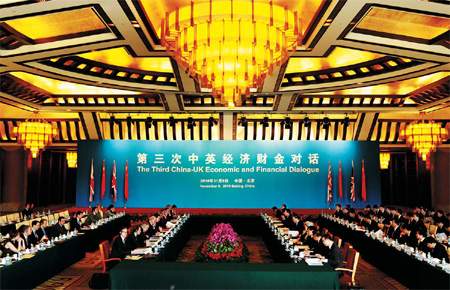Putting great store in Sino-UK ties
The Chinese premier reaffirmed his nation's commitment to intellectual property rights protection, vowing to provide a more transparent, regulated and convenient environment for investment. He also promised to encourage more Chinese investment in Britain, calling for a simple administrative process, more targeted service and easier visa application.
In response, Cameron said Britain views China's development as an opportunity and welcomed Chinese companies' participation in the UK's infrastructure construction.
In 2009, UK exports to China increased by 6.2 percent year-on-year, despite trade with other countries dropping dramatically due to the global financial crisis.
In the first three quarters of 2010, British investment in China also expanded by 43 percent year-on-year, according to Sun Yongfu, director-general of European affairs department for China's Ministry of Commerce.
"Overall, the Sino-UK relationship has been stable, especially compared to relationships with (other nations in) Europe. It has always been very practical," Tian Dewen, an expert on UK studies at the Chinese Academy of Social Sciences, told China Daily.
Cameron is scheduled to meet President Hu Jintao on Wednesday to focus on the topic of the G20 summit in Seoul, the South Korean capital, this week. He will leave Beijing later that day after giving a speech at Peking University.
A Perfect Fit
Also on Tuesday, Vice-premier Wang Qishan and Osborne jointly chaired the third China-UK Economic and Financial Dialogue and announced a slew of cooperative programs for the coming years, including in the areas of trade, finance, high-technology, infrastructure, low-carbon economy and cutting emissions.
China is the world's largest exporter of goods while Britain is the second largest exporter of services, which means the two have promising cooperative opportunities in a wide range of fields, Osborne told the media after the meeting. "Our economies are complementary," he said.
The dialogue also achieved 41 policy outcomes, with both sides agreeing, among others, to promote bilateral trade and investment. The UK said it would welcome more Chinese investment, including from sovereign wealth funds.
That could be a positive signal for China's $200-billion sovereign wealth fund, China Investment Corporation (CIC), said analysts.
The CIC has been shown the cold shoulder in some countries because it is feared that the financial giant could disrupt markets and grab key resources, despite its reiteration that it is aimed at long-term investment that would stabilize financial markets.
Britain also affirmed that it would support China's full market economy status "as early as possible" and will continue to "play a constructive role to encourage EU recognition", according to a statement released following the dialogue.
 0
0 







